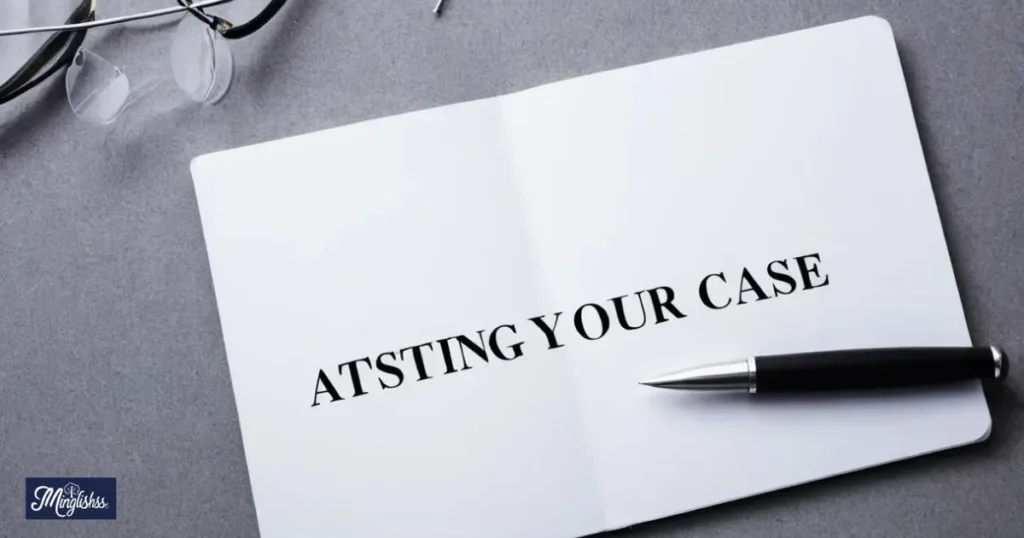“Defending your values and asserting your rights is essential for personal growth and confidence.”
Standing up for yourself is about asserting your rights, expressing your needs, and defending your values without fear. It’s a skill that boosts confidence and is essential in both personal and professional settings. In situations where you need to articulate your stance or defend your boundaries, knowing a variety of phrases can strengthen your ability to communicate your intentions effectively.
In this article, we’ll explore 30 different ways to express the concept of standing up for yourself. These alternatives not only help convey your message but also add nuance, helping you match your words to the context and audience. By using these phrases, you can empower yourself to address challenges, set boundaries, and protect your values.
1. Asserting Your Boundaries
Scenario: “She made it clear by asserting her boundaries with respect.”
Explanation: This phrase focuses on setting limits in a respectful yet firm way.
Additional Tip: Use in professional contexts when clarifying acceptable behavior.
2. Advocating for Your Needs
Scenario: “He is very good at advocating for his needs in the workplace.”
Explanation: Highlights speaking up about personal needs or requirements.
Additional Tip: Useful in negotiation or workplace discussions.
3. Defending Your Rights
Scenario: “Defending your rights is crucial in any situation where fairness is questioned.”
Explanation: This emphasizes the importance of protecting your entitlements.
Additional Tip: Ideal for legal or personal discussions where fairness is at stake.
4. Speaking Up
Scenario: “By speaking up, she made sure her voice was heard.”
Explanation: This is a straightforward way to describe expressing one’s views.
Additional Tip: Effective in group settings or meetings.
5. Taking a Stand
Scenario: “He wasn’t afraid to take a stand when he disagreed.”
Explanation: This phrase indicates showing courage in defending one’s beliefs.
Additional Tip: Suitable for debates or situations involving differing opinions.
6. Being Assertive

Scenario: “Being assertive helped him gain respect among colleagues.”
Explanation: Indicates self-assurance and clarity in expressing oneself.
Additional Tip: Great for professional self-development.
7. Holding Firm
Scenario: “She held firm on her position despite the pressure.”
Explanation: Emphasizes resilience in maintaining a stance.
Additional Tip: Useful when dealing with persistent opposing views.
8. Standing Firm
Scenario: “Standing firm in his beliefs showed his integrity.”
Explanation: This phrase conveys stability and conviction.
Additional Tip: Works well in discussions about values or principles.
9. Claiming Your Space
Scenario: “She isn’t afraid of claiming her space when necessary.”
Explanation: Implies taking up the necessary emotional or physical room.
Additional Tip: Great for discussions around self-worth.
10. Defending Your Position
Scenario: “He defended his position with confidence.”
Explanation: Emphasizes clarity in stating one’s viewpoint.
Additional Tip: Effective in debates or structured arguments.
11. Holding Your Ground
Scenario: “She held her ground despite the criticism.”
Explanation: Conveys staying firm despite opposition or adversity.
Additional Tip: Useful when facing difficult conversations.
12. Stating Your Case

Scenario: “He stated his case eloquently and won support.”
Explanation: This phrase emphasizes presenting one’s perspective clearly.
Additional Tip: Great for legal or formal settings.
13. Refusing to Back Down
Scenario: “Refusing to back down showed her strength.”
Explanation: This phrase conveys resilience in the face of opposition.
Additional Tip: Works well for situations requiring strong determination.
14. Asserting Your Beliefs
Scenario: “He was clear in asserting his beliefs without apology.”
Explanation: Emphasizes confidence in expressing personal values.
Additional Tip: Use when sharing or discussing core values.
Other Ways to Say “Straight to the Point”
15. Declaring Your Stance
Scenario: “She declared her stance on the issue without hesitation.”
Explanation: Focuses on being open and clear about a position.
Additional Tip: Great for situations requiring transparency.
16. Making Your Voice Heard
Scenario: “Making her voice heard empowered her to ask for more.”
Explanation: Emphasizes importance in ensuring one’s opinion is noticed.
Additional Tip: Suitable for group discussions.
17. Setting Clear Boundaries
Scenario: “By setting clear boundaries, she maintained her peace.”
Explanation: This phrase emphasizes the importance of defining acceptable limits.
Additional Tip: Effective in relationships and team dynamics.
18. Protecting Your Interests
Scenario: “He focused on protecting his interests during negotiations.”
Explanation: Emphasizes defending personal or professional priorities.
Additional Tip: Great for business or financial discussions.
19. Standing Your Ground
Scenario: “Standing his ground showed his colleagues his resolve.”
Explanation: Indicates determination to maintain one’s position.
Additional Tip: Useful for leadership or assertiveness training.
20. Stating Your Boundaries
Scenario: “She was clear in stating her boundaries early on.”
Explanation: Emphasizes the importance of defining personal limits.
Additional Tip: Useful for relationships and conflict resolution.
21. Establishing Your Boundaries
Scenario: “He established his boundaries at the start.”
Explanation: This phrase highlights taking action to define personal space.
Additional Tip: Ideal for workplace or relationship contexts.
22. Being Firm
Scenario: “She was firm in her response, showing she wouldn’t be swayed.”
Explanation: Indicates decisiveness and confidence.
Additional Tip: Great for high-pressure situations.
23. Showing Resilience

Scenario: “By showing resilience, he gained respect.”
Explanation: Emphasizes strength in difficult situations.
Additional Tip: Useful for inspirational contexts.
24. Staying True to Yourself
Scenario: “Staying true to herself gave her confidence.”
Explanation: Highlights the importance of self-honesty and authenticity.
Additional Tip: Great for personal development.
25. Declining to Compromise
Scenario: “He declined to compromise his values.”
Explanation: Conveys dedication to personal principles.
Additional Tip: Ideal for ethical discussions.
26. Showing Self-Respect
Scenario: “She showed self-respect by speaking up.”
Explanation: Emphasizes the value of respecting oneself.
Additional Tip: Great for encouraging self-worth.
27. Holding to Your Convictions
Scenario: “Holding to his convictions made him a role model.”
Explanation: Indicates strong moral or ethical stance.
Additional Tip: Effective for leadership discussions.
28. Taking Charge of Your Space
Scenario: “Taking charge of her space helped her feel more secure.”
Explanation: Implies responsibility for one’s personal boundaries.
Additional Tip: Great for personal empowerment topics.
29. Respecting Your Own Values
Scenario: “By respecting his own values, he earned respect from others.”
Explanation: Focuses on the importance of self-respect and integrity.
Additional Tip: Useful for self-improvement discussions.
30. Making Firm Decisions
Scenario: “Making firm decisions helped him navigate challenging situations.”
Explanation: Emphasizes clarity and strength in decision-making.
Additional Tip: Effective in career and personal development.
31.To Be Direct

Scenario: Mujah delivers feedback to her team, focusing on key areas for improvement.
Explanation: Being direct ensures that the message is clear and unambiguous, fostering a straightforward conversation.
Additional Tip: Use a calm tone when being direct to ensure the message is well-received.
32.To Get to the Heart of the Matter
Scenario: In a meeting, Mujah emphasizes the main issues affecting the project without unnecessary details.
Explanation: This phrase conveys the essence of the discussion, allowing for focused and relevant dialogue.
Additional Tip: Summarize the main points before diving into details to maintain clarity.
33.To Cut to the Chase
Scenario: Mujah addresses her colleagues, urging them to focus on the most critical elements of their proposal.
Explanation: This expression encourages participants to eliminate extraneous information and focus on what matters most.
Additional Tip: Use this phrase to regain attention if discussions become too lengthy or off-topic.
34.To Speak Clearly
Scenario: Mujah presents a report, ensuring that her points are articulated in a straightforward manner.
Explanation: Speaking clearly helps prevent misunderstandings and keeps the audience engaged.
Additional Tip: Avoid jargon and complex vocabulary to enhance understanding.
35.To State the Essentials
Scenario: Mujah summarizes her findings, highlighting only the necessary information for her audience.
Explanation: This phrase emphasizes the importance of sharing only the most critical facts and figures.
Additional Tip: Prioritize key points to convey essential information efficiently.
Answers to Key Question
1. Why should I learn different phrases for “standing up for yourself”?
Having varied phrases allows you to adapt your communication to fit different contexts and convey strength effectively.
2. Can these phrases help in professional settings?
Yes, many of these phrases are ideal for professional use, helping you assert yourself in a respectful and formal manner.
3. How do I choose the best phrase for a situation?
Consider the context, your audience, and the tone you want to set. More formal phrases may suit work settings, while softer options may fit personal discussions.
4. Are these alternatives suitable for conflict situations?
Yes, these phrases can help you communicate boundaries and needs clearly, even during conflicts.
5. Will using these phrases improve my confidence?
Absolutely! Practicing these phrases can build your self-confidence and make you feel more in control.
Pros and Cons of Standing Up for Yourself
| Pros | Cons |
| Boosts Confidence: Asserting oneself builds self-esteem. | Potential Conflicts: Some may react defensively. |
| Sets Healthy Boundaries: Ensures personal space and respect. | Misunderstandings: Can be misinterpreted as aggression. |
| Encourages Respect: Others often respect assertiveness. | Risk of Rejection: Some may not respond positively. |
| Fosters Independence: Promotes autonomy and personal strength. | Emotional Drain: Constantly asserting oneself can be tiring. |
| Promotes Personal Growth: Helps in developing self-worth. | Social Pushback: Not everyone appreciates boundary-setting. |
Conclusion
Learning to stand up for yourself is invaluable for maintaining self-respect and achieving your goals. By exploring these 30 alternative ways to express self-assertion, you can add depth to your communication and empower yourself to act confidently.
Each phrase offers a slightly different angle on self-advocacy, helping you adapt to various situations and audiences.
With consistent practice, standing up for yourself becomes second nature, helping you build strong, respectful relationships and fostering a sense of personal empowerment.

Hi, I’m Ethan Matthews: I make English easy with my clear and simple teaching style. I love helping learners feel confident in every lesson.










